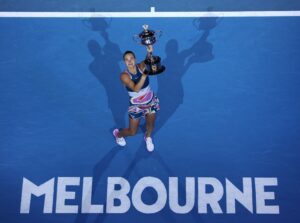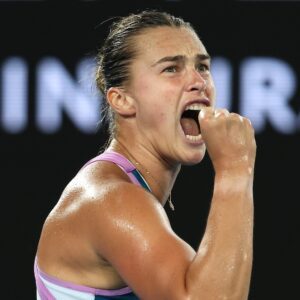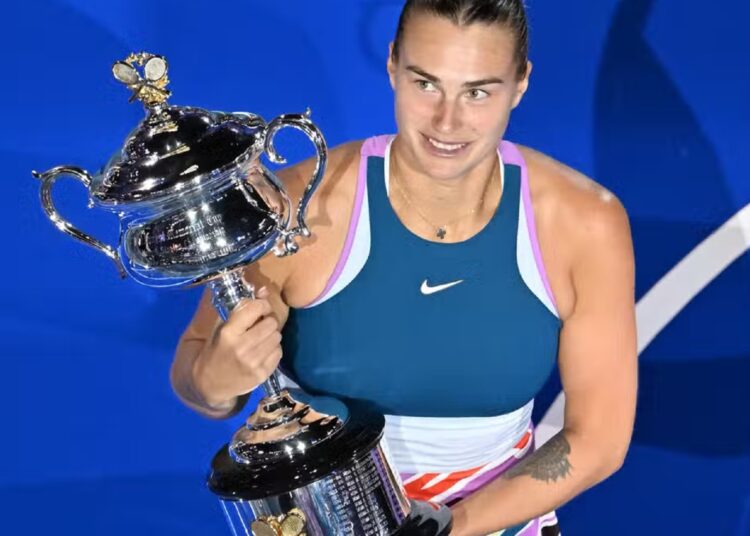MELBOURNE, Australia — Aryna Sabalenka´s Australian Open championship is about persistence. It´s about the value of confronting, not ignoring, problems. It´s about putting in the time and the effort required to get better.

And, to hear Sabalenka and her team tell it, it´s as much about the way she reconfigured her self-belief as it is about the way she reconfigured her serving technique.
“I always had this weird feeling when people would come to me and ask for a signature. I would be like, `Why are you asking for (my) signature? I´m nobody. I´m a player. I don´t have a Grand Slam,” Sabalenka said after that last phrase no longer applied because she had defeated Elena Rybakina 4-6, 6-2, 6-3 in the final.

“I just changed how I feel. I start respect myself more,” Sabalenka continued, between celebratory sips of bubbly. “I start to understand that, actually, I´m here because I work so hard and I´m actually a good player.”
That goes a long way, especially when the going gets tough under the bright lights and on the big stage of a major tournament.
“Every time I had a tough moment on court,” the 24-year-old from Belarus said, “I was just reminding myself that I´m good enough to handle all this.”
There were plenty of those moments over the years – and against Rybakina, who won Wimbledon last year and was the first woman in 22 years to beat three past Slam champions to get to the Australian Open final.

Then, there was the double-fault on the very first point, the double-fault nearly 2 1/2 hours later on Sabalenka’s first of what would be four match points, the loss of the first set, and so on.
But Sabalenka’s retooled serve ended up producing 17 aces, more than enough to outweigh seven double-faults, and her 51 winners helped propel her to three pivotal breaks.
A year ago in Melbourne, Sabalenka double-faulted 15 times in a fourth-round exit. That set the tone for a season in which she led the tour with 400 double-faults, sometimes more than 20 in a match.
“She was kind of, like, afraid just to talk about it,” said her coach, Anton Dubrov.
He and Sabalenka’s fitness coach, Jason Stacy, kept trying to get her to reconstruct her serve. She resisted. Things got tough.
Dubrov thought about quitting. But they all stuck with it. Sabalenka agreed to see a biomechanics expert who was part of the five-day project to change her serve about three weeks before the U.S. Open began last August.
She made the semi-finals before losing to No. 1 Iga Swiatek, the eventual champion. That continued a pattern: Sabalenka was 0-3 in the final four at Grand Slam tournaments until this week.

But now things are different. She is not as stressed out about her serve. She is not as reliant on others to help her self-esteem, no longer employing a sports psychologist. (“I´m my psychologist,” she said with a laugh.)
“There is a lot of seeds we have been planting for several years now, that have been slowly growing over time.
“The experience last year – of facing a lot of humility and fear, and instead of avoiding it or trying to go around it, she went right through it, hit it face-on,” Stacy said according to AP.
“I think going through that process has helped her kind of realize, Oh, the best way, really, actually, is what everyone always says: to face your fear and go through it.
“I think it´s given her this more internal belief that, OK, even if this particular game or this moment in a match is tough, it´s like, OK, just keep going and it will all come back together.”
That describes what happened. Now it will be fascinating to see how far Sabalenka can go and what she can accomplish.
She is 11-0 in 2023. She will move up to No. 2 in the rankings Monday, behind only Swiatek.
And she is always, and forever, a Grand Slam champion. That ought to help the self-belief.
“I think it’s even more enjoyable, I would say, after all those tough matches,” said Sabalenka, a 24-year-old from Belarus.
“I really feel right now that I really needed those tough losses to kind of understand myself a little bit better. It was like a preparation,” She added according to Reuters.
“I actually feel happy that I lost those matches, so right now I can be a different player and just different Aryna.”
With the No. 22 seed Rybakina, the reigning Wimbledon champion serving at 3-3 in the third set, Sabalenka turned up the heat on her opponent.
While the average speed of her forehand had been about 77 mph throughout the match,
Sabalenka found another gear and hit 87 mph with her forehand in that pivotal game and gained a service break.
In all, Sabalenka hit more aces (17 to 9) and winners (51 to 31). Her 17 aces were the second most in a WTA Tour final since 2008.
Rybakina, 23, gave the credit to Sabalenka. “I would say that not many girls can put me really under the pressure,” Rybakina said.
“Against her, it’s not easy because she has a great serve and she plays really aggressive. Her ball is coming very heavy. There is maybe few girls who plays like this.






Discussion about this post